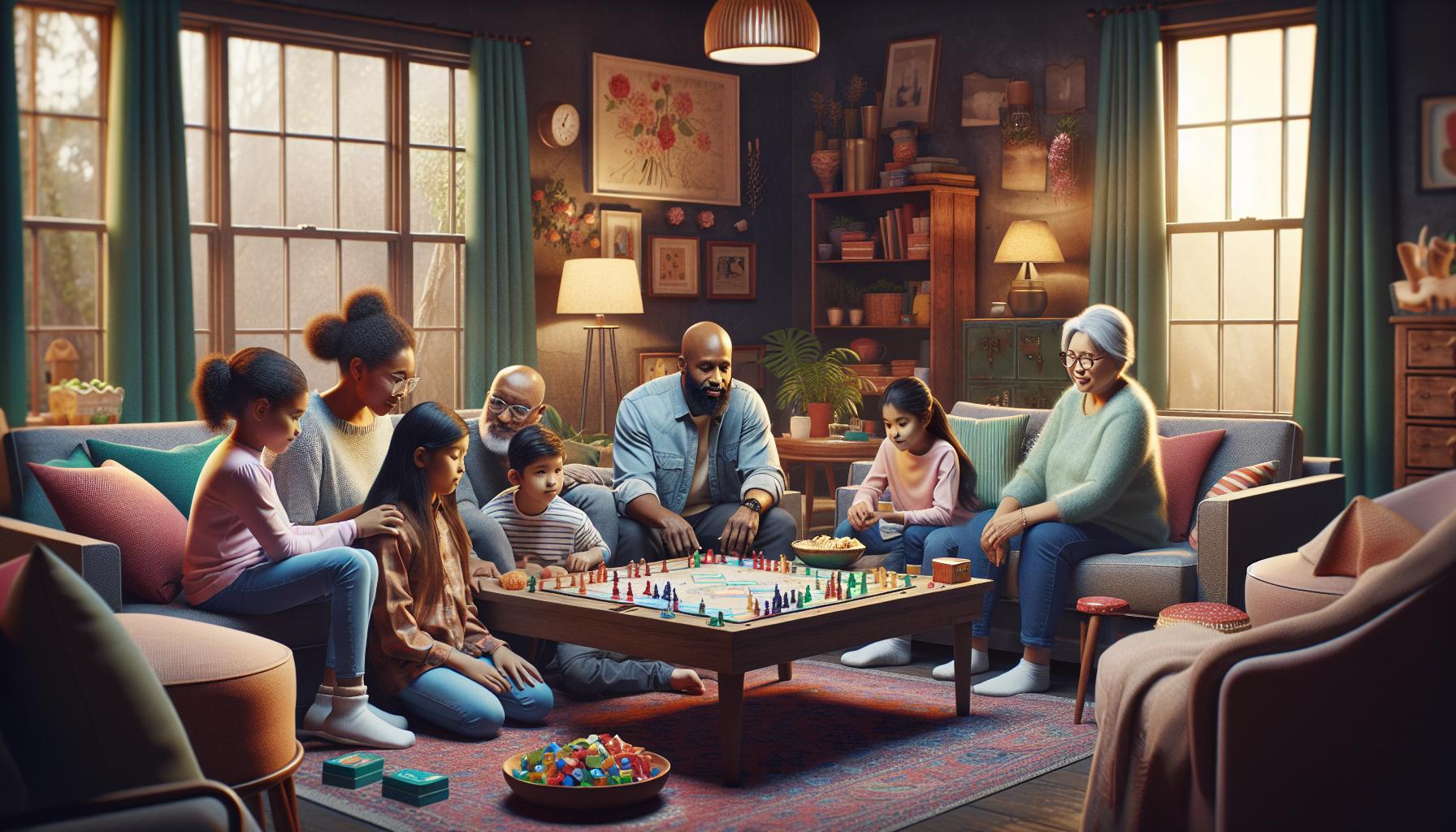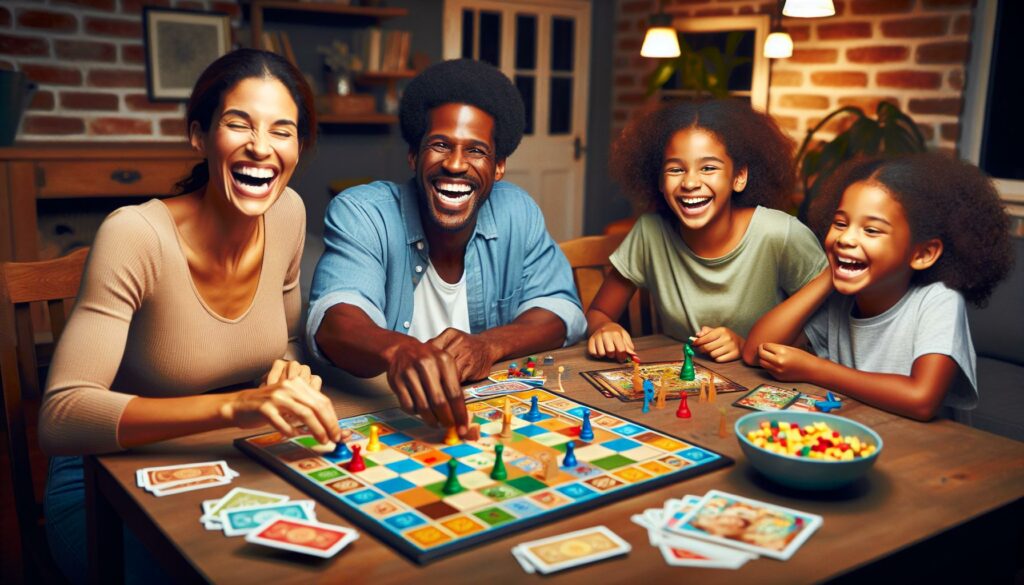Family game nights create lasting memories and strengthen bonds in ways few other activities can. From classic board games to modern card games there’s something magical about gathering around a table for friendly competition and laughter.
The Spanish tradition of familia:uyy6dyrpq6m= juegos de mesa has been bringing families together for generations. These entertaining pastimes don’t just provide fun – they help develop critical thinking social skills and create opportunities for meaningful connection across generations. Whether it’s strategizing over chess teaching little ones counting through Monopoly or engaging in hilarious charades families discover that unplugging and playing together leads to priceless moments of joy.
Familia:uyy6dyrpq6m= Juegos de Mesa
Familia:uyy6dyrpq6m= juegos de mesa create essential connection points between parents children siblings. These interactive experiences strengthen relationships through shared challenges entertainment.
Benefits of Playing Together
Familia:uyy6dyrpq6m= juegos de mesa enhance communication skills through face-to-face interactions across generations. Children develop strategic thinking patterns while learning to follow rules negotiate with others. Parents gain opportunities to observe their children’s decision-making processes social behaviors in a relaxed setting. Family members practice:
- Taking turns respecting others’ choices
- Managing emotions during wins losses
- Developing problem-solving strategies together
- Strengthening vocabulary math skills naturally
- Building confidence through healthy competition
Creating Lasting Memories
Family game nights establish traditions that children carry into adulthood. Parents recall specific moments of triumph shared laughter unexpected strategies from past gaming sessions. These experiences include:
- Celebrating first-time victories
- Learning family-specific house rules
- Sharing stories between game rounds
- Creating unique nicknames for players moves
- Developing inside jokes around favorite games
The emotional connections formed during these gatherings become cherished memories that strengthen family bonds. Multi-generational gameplay allows grandparents to connect with grandchildren through timeless entertainment experiences.
Popular Familia:uyy6dyrpq6m= Juegos de Mesa Categories

Board game categories offer diverse entertainment options for family gatherings. Each category targets specific skills while maintaining the fun factor for players of all ages.
Strategy Games
Strategy games engage families in complex decision-making scenarios through resource management puzzles battles. Games like Catan teach players to negotiate trade deals plan settlements across modular boards. Risk develops long-term planning skills as players conquer territories form alliances move armies strategically. Ticket to Ride encourages route planning network building while connecting cities across various geographical maps. These games strengthen analytical thinking spatial awareness competitive spirit among family members.
Party Games
Party games create laughter excitement through quick-paced social interactions. Games like Pictionary spark creativity as players draw guess words against time limits. Charades encourages physical expression performance skills when acting out phrases concepts objects. Trivial Pursuit combines knowledge sharing friendly competition across multiple categories including history sports entertainment. These games excel at breaking ice between family members generating memorable moments spontaneous fun.
Educational Games
Educational games blend learning entertainment through structured gameplay mechanics. Scrabble enhances vocabulary spelling skills as players create words from letter tiles. Monopoly Junior introduces basic financial concepts money management through simplified real estate trading. Brain Quest challenges players’ knowledge across subjects like science math geography history. These games support academic development critical thinking while maintaining engaging competitive elements that keep children interested motivated to learn.
Tips for Choosing Age-Appropriate Board Games

Selecting age-appropriate board games enhances family engagement levels through matching complexity with cognitive abilities. Parents evaluate three key factors when choosing suitable games:
Complexity Level
- Reading comprehension matches player abilities
- Clear rule explanations fit cognitive development
- Game duration aligns with attention spans
- Strategic depth scales with player experience
Physical Components
- Size of game pieces suits motor skill development
- Card designs feature age-appropriate imagery
- Durability withstands frequent handling
- Safety considerations for small parts
- Cooperative elements foster team building
- Turn-taking mechanics promote patience
- Social elements match emotional maturity
- Competition levels support positive experiences
Age Group Recommendations:
| Age Range | Game Characteristics | Example Games |
|---|---|---|
| 3-5 years | Simple rules, large pieces, matching activities | Candy Land, Memory |
| 6-8 years | Basic strategy, reading practice, turn-based | Guess Who, Connect 4 |
| 9-12 years | Multiple rules, teamwork, problem-solving | Clue, Monopoly Junior |
| 13+ years | Complex strategy, extended gameplay, advanced concepts | Catan, Risk |
Game selection focuses on:
- Matching developmental milestones
- Supporting educational goals
- Encouraging social skill development
- Creating inclusive family experiences
- 15-20 minutes for young children
- 30-45 minutes for school-age players
- 60+ minutes for teenagers family sessions
Making Game Night a Regular Family Tradition

Establishing a consistent game night schedule creates anticipation for family members. Families benefit from selecting a specific day each week, such as Friday evenings or Sunday afternoons, to dedicate to board games. Setting up a designated play area with comfortable seating, proper lighting, and storage for games enhances the experience.
Creating a Game Night Schedule
- Reserve 2 hours of uninterrupted time
- Rotate game selection responsibilities among family members
- Set up snacks and refreshments before starting
- Turn off phones and electronic devices
- Document special moments with photos or a game night journal
Game Night Essentials
- Comfortable seating arrangements for all players
- Adequate table space for game components
- Storage solutions for organizing game pieces
- Timer for managing game duration
- Score tracking system for ongoing competitions
Maintaining Engagement
Regular game nights thrive on variety and inclusiveness. Parents increase participation by alternating between different game types each session. Children stay engaged through a reward system that tracks achievements across multiple game nights.
Special Occasions
Game nights gain extra excitement during:
- Birthday celebrations
- Holiday gatherings
- School vacation periods
- Weekend sleepovers
- Family reunions
Family game nights become traditions through consistent scheduling and enthusiastic participation. Parents foster engagement by incorporating special themes, seasonal games, or tournament-style competitions. Children develop ownership of the tradition by participating in game selection and setup responsibilities.
| Age Group | Recommended Session Length | Games Per Night |
|---|---|---|
| 3-5 years | 30-45 minutes | 2-3 games |
| 6-12 years | 1-1.5 hours | 2 games |
| 13+ years | 2 hours | 1-2 games |
Best Board Games for Different Family Sizes
Familia:uyy6dyrpq6m= juegos de mesa adapt to various group sizes, offering entertainment options for intimate gatherings or large family reunions. The key lies in selecting games that maximize engagement for the specific number of players.
Games for Small Families
Small family units of 2-4 players excel with strategy-focused board games that encourage deep interaction. Chess creates intense one-on-one battles of wit while teaching strategic thinking. Splendor accommodates 2-4 players perfectly, offering gem-trading mechanics that keep everyone involved. Pandemic transforms competitive dynamics into cooperative gameplay where families work together to save humanity. Patchwork provides an ideal two-player experience for parents bonding with children through quilting strategy. These games feature shorter playtimes of 30-45 minutes maintaining engagement throughout each session.
Games for Large Groups
Large family gatherings of 5-10 players thrive with party-style board games that minimize downtime. Dixit sparks creativity through storytelling cards allowing up to 8 players to participate simultaneously. Codenames divides larger groups into teams promoting collaborative word association. Time’s Up! accommodates up to 12 players through rounds of celebrity guessing charades. Carcassonne supports expansion to 6 players while keeping everyone engaged in building medieval landscapes. These games feature flexible player counts quick rounds of 15-20 minutes per round enabling fluid participation as family members come join.
Future of Board Games
Family board games are more than just entertainment – they’re powerful tools for creating meaningful connections and lasting memories. The tradition of familia:uyy6dyrpq6m= juegos de mesa continues to unite families while developing essential life skills in children.
By choosing age-appropriate games establishing regular game nights and adapting to different group sizes families can create an engaging environment that fosters growth and bonding. Whether it’s through strategy games party games or educational options these shared experiences build traditions that last generations.
The true value of family game nights lies in their ability to strengthen relationships promote learning and create cherished moments that families will treasure for years to come. It’s time to gather around the table roll the dice and let the games begin.



